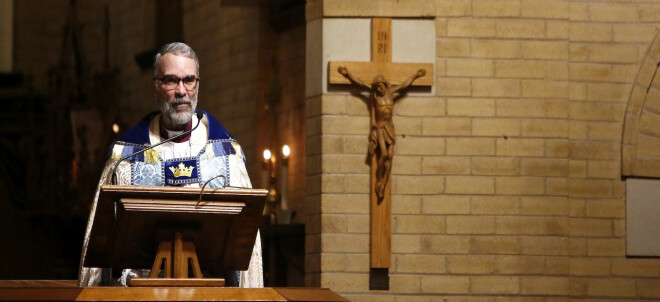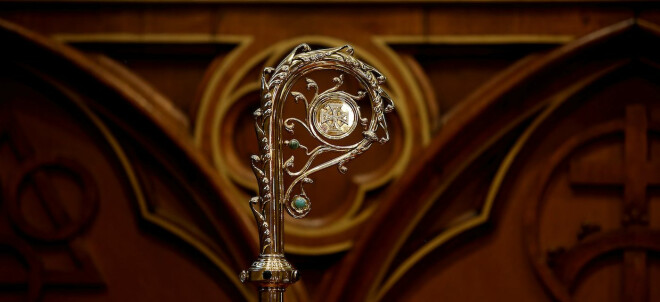Watch the speech here, or read below.
It is a great delight for Stephanie and Samuel and me to be with you tonight, so some thanks are in order, first to the chair of the Wycliffe board - our work together has ended, but NFL trash talking goes happily on unabated. Thanks to the stellar Wycliffe faculty, especially my old friend professor Ephraim Radner, from whom, given how much he knows about me, I figure I got off lightly. To the staff – if you graduates want to know the secret of leading a religious institution, easy… find the closest facsimile of Barbara, Rob, Peter or Karen, hire them, then go for squash and lunch! Thank you to my fellow honorands, one a Wycliffe grad from my era - you make me feel old, the other once a pastor to my family at St. Paul’s- well deserved congrats to you both. And finally thank you to the splendid principal of this College and to Fawna, who will make her own great contribution to the proud tradition of wives of principals.
In the name of …
The boarding school I attended as a teenager had as its motto, “finis origine pendet,” which is Latin “for the end depends on the beginning.” And by the same right we might cite the wisdom of the Greeks, that you should count no one happy until he or she comes to the end of the matter. I want this evening to reflect briefly on beginnings and endings, and in particular what they have to say about the lives of teaching, pastoring, and serving, of ministering, which you, dear fellow graduates, now commence. For this purpose, indulge me in two stories, both personal, both about Wycliffe, but both having, I hope, a wider pertinence.
It was Easter Monday, 1999. I had in the preceding year received my quota of blood, sweat, toil, and tears, called doctoral theological study, and again as much for Stephanie. I believed that God had called me to this new kind of ministry. We had moved into a two-room cottage next to my in-laws, so as to write my dissertation in their basement. And I had tried for two years to find a teaching job, and had failed. My hopes for our future were not to be, and I could not justify running us further into penury. Stephanie said that driving to interview at my future parish, I looked like a man going to his own funeral (actually going to a parish, I might add, which was enormously kind and sheltering of us at a key moment). On Easter, my acceptance of their call was announced. One day later the phone rings: a friend from graduate school, at a seminary in the south said, “George, we want to hire a theologian of mission. I’ve talked to the committee, and they’ve got you specifically in mind.” My ship had come in, Moby dick was in the harpoon sights - one day late sure… but I haven’t gone anywhere yet…maybe its not too late…it’s what God wants anyway….In a quandary I called a retired bishop, a mentor for whom I had worked a decade before. He replied “George I am trying to figure out why you are calling me. It’s not because you want me to tell you what to do. You know what you need to do. Maybe you want me to say that sometimes it seems God has a cruel sense of humor - I can do that if you like. But if you promised those folks… you’re going.” And go I did, and had to figure out how to keep the coals of a theological avocation alive while in the parish. A few years later I met Professor Alan Hayes, and accepted his invitation to fill in a sabbatical with a fall adjunct course at Wycliffe… I drove the QEW into the bright lights of the city Sunday nights, I slept in the second floor broom closet, and taught one of our honorands; I made enough money to buy a gateway computer with a hard-drive, and thought I had died and gone to heaven. It was not the last I would see of Hoskin Avenue.
My point is not to say, look at my faithfulness, quite the contrary. I was actually leaning toward bolting for academia. But I got some good advice at the right moment. The point here is simple. My own best intentions and imaginings were not, in retrospect, to be equated with God’s will; lo and behold, He knew more than I did! And he had a great blessing in store for me of which I knew nothing, and could not have planned. Wrestle, complain, knock, but finally trust that what the one who knows every hair on your head has in mind for you is better than what you can ask or imagine, and in that light, enjoy a sheer curiosity in the divine plan as you each set out, in one way or another, for a country you do not know.
If that was the beginning, what should be said about the ending? I suppose what ties the two together is that, in me, God is dealing with a willful character- surely he has his hands full with you too. No less an expert than Bishop Peter Mason told me, when I first arrived at Wycliffe, that principal was simply the best job in the Canadian church. Leaving is always hard for pastors: It ought to be. But such experiences remind us what ministry really is. My friend and squash opponent Ajit John always told me to hold things more lightly, and I pass that advice on to you. With time, we see that what we are holding really belongs to God. We church leaders are only stewards. Something as precious as this place is handed to us, and in time we hand it on. That is true for everyone on this stage. What matters is what you are handing on, the pearl of greatest price. We can affix some classy Latin to it- ministry is all tradition, handing on. In I Corinthians Paul says ‘for I received from the Lord what I also handed on to you…’ We hand on the Gospel in the Scriptures and the sacraments, as they were handed to us. Nowadays we Anglicans have institutions of new incumbents, in which the clergy are handed the book and the cup and the water and the keys, so as to hand them back and on in time. If bishops have any use, which is a live question, it is to be living signs of this handing on. As a more traditional Anglican in the late innings of ministry in a confused and conflicted era, the goal of preserving what we have received for another time and generation we will not see, becomes increasingly compelling.
Seeing matters in this way, I have gratitude as well as anticipation of what God has in store for this place in the years to come. Though you all may not see it fully until you are older, your ministries too are all holding God’s gift lightly and faithfully handing it on in his time, and from this you will feel a great relief.
Well, this is Wycliffe and I had better not sit down before I say something about our Bible reading. Hebrews reminds us that we are surrounded by a cloud of witnesses, prophets, apostles, saints, martyrs, missionaries, theologians, pastors going before us, from whom the faith has been handed on in trust, and in whose lines each of you graduates stand as stewards. Remember in thanksgiving before God all those in your own lives who are now part of that cloud, as that wise bishop and many others were for me. As graduates from this place, include in that cloud those who missionized this nation and in some cases the world, sometimes with great suffering, and imagine them handing on a commission to you this evening, one that you are entrusted to hold, I hope lightly and faithfully, so as to hand it on in your day. Find encouragement from them in your forthcoming journey, recalling with the writer of Hebrews that it is ultimately with the living God, with whom you have to do. Recall how, in the preceding chapter of Hebrews, some witnesses in history served and suffered in hope, not yet knowing where God was leading them. But ultimately we look in all these things to our pioneer, Jesus, because he trusted where his father was leading him, and listened to the cloud of witnesses, the prophets before him, and allowed himself to be handed over so that the gospel of his resurrection could be handed on to his disciples. All of this is comprised in his victory on our behalf, so that he might be the one immoveable point of reference for all that lies ahead for each of you. In him, we for our part are greatly encouraged as we look at you the next generation, so that our definitely aging knees do not droop.
God bless you all, Amen.





